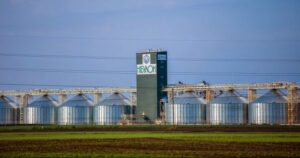
One of the largest grain market operators in Ukraine, JV Nibulon LLC, has modernized two elevator complexes in Mykolaiv region, the grain trader’s press service reported on its Facebook page.
According to the report, a second transshipment line was built at the Vradiyevsky agricultural complex, which doubled the capacity and changed the scheme of acceptance and shipment. Nibulon expects that instead of 50-80 tons per hour, the complex will be able to unload 150-180 tons per hour.
In addition, the second auto-loading point at this branch was re-equipped: the size of the loading pit was significantly increased, a modern shed with roller shutters was built, transport equipment was replaced, and an automatic process control system was installed on the new equipment.
The agro-industrial complex also expanded the area of concrete roads, which gave farmers a complete route from the laboratory through the weighing room to the loaders. The improvements have significantly reduced the time for unloading grain and enabled us to work with several crops simultaneously.
At the Kolosivsky Elevator branch, the company increased the productivity of the process of unloading grain onto trucks by installing two bins with a capacity of 40 tons each. They allow for quick accumulation and shipment of grain. Four pieces of transportation equipment under the first and second truck unloaders were also replaced.
Nibulon JV LLC was established in 1991. Prior to the Russian military invasion, the grain trader had 27 transshipment terminals and crop reception complexes, a capacity for simultaneous storage of 2.25 million tons of agricultural products, a fleet of 83 vessels (including 23 tugs), and owned the Mykolaiv Shipyard.
“Before the war, Nibulon cultivated 82 thousand hectares of land in 12 regions of Ukraine and exported agricultural products to more than 70 countries. In 2021, the grain trader exported the highest ever volume of 5.64 million tons of agricultural products, reaching record volumes of supplies to foreign markets in August – 0.7 million tons, in the fourth quarter – 1.88 million tons, and in the second half of the year – 3.71 million tons.
Nibulon’s losses due to Russia’s full-scale military invasion in 2022 exceeded $416 million.
Currently, the grain trader is operating at 32% of capacity, has created a special unit to clear agricultural land of mines, and was forced to move its headquarters from Mykolaiv to Kyiv.

Nova Poshta, the largest logistics operator in Ukraine, is going to open two new offices in Spain – one in Barcelona and one in Benidorm, said Sergey Karputev, CEO of Nova Post in Spain.
“We are currently focusing on two areas of development: improving our services and developing our network. In the near future, we plan to open another branch in Barcelona and one in Benidorm,” he said.
According to the company’s press service, there are currently six Nova Poshta offices in Spain.
In Barcelona, the first branch was opened in September. It accepts shipments of up to 1 thousand kilograms.
The other five, in particular in Valencia, Alicante, Málaga and Torevieja, started operating in June-September. They accept parcels up to 30 kg.
In addition, Nova Poshta has started delivering parcels to post offices and pickup points. The company delivers prepaid parcels weighing up to 25 kg to 13.38 thousand InPost and GLS parcel delivery points, as well as to 1350 InPost post offices throughout Spain.
In this country, Nova Poshta customers can receive and send documents, parcels and cargo to/from Ukraine to other cities, as well as to 13 European countries where the company has offices. Delivery time: from Ukraine – from five business days, in Spain and between European countries – from one day, the press service said.
In addition, customers can order delivery or pickup by courier to any address in Spain.

The war has led to an 85% drop in inbound tourism, which will lead to a decrease in revenues of more than $1 billion by 2024 and more than $12.7 billion by 2030, the press service of the Ukrainian Hotel & Resort Association (UHRA) reports.
Such data follows from the study “Economic Impact of the War on the Tourism and Hospitality Sector of Ukraine: Losses, Innovations and Resilience”, conducted with the support of the State Agency for Tourism Development of Ukraine (DART) in partnership with the UHRA, the Association of Inbound Tour Operators of Ukraine (AITOU), the All-Ukrainian Association of Guides (UAG), the Ukrainian Restaurant Association (URA) and the Ukrainian Culinary Association (UCA).
“Before the outbreak of full-scale war, Ukraine’s tourism sector was on a path of steady growth, contributing $1.6 billion to the national economy and providing 1.2 million jobs. The war has undermined this progress, but with coordinated recovery efforts and targeted international investment, the sector can rebound and once again become a vital engine of Ukraine’s economic recovery,” UHRA President Iryna Sidletska was quoted as saying in the release.
According to the study, it is expected that by the end of 2024, tourism revenues in Ukraine will be more than $1 billion below pre-war forecasts. Total revenue losses by 2030 are estimated at $12.7 billion.
At the same time, the number of jobs by the end of 2024 will be reduced by more than 60% compared to pre-war levels. Experts expect that by 2034, the total number of jobs in the industry will increase to 1 million, which is 540 thousand jobs less than in the pre-war scenario.
The tourism industry is forced to develop in the face of a shortage of investment. The amount of suspended foreign and domestic private investment is estimated at tens of billions of dollars.
GART Chairwoman Mariana Oleskiv emphasized that despite the ongoing war, Ukraine’s tourism industry is showing resilience.
“We are grateful to our partners for analyzing the macroeconomic indicators of the Ukrainian tourism industry, which confirmed that the priority chosen by the Agency – the development of domestic tourism – is correct, especially in conditions when we have almost lost outbound tourism, and inbound tourism, according to this study, has decreased by 85%. Our efforts have resulted in a steady increase in tax revenues in the tourism sector and an increase in hotel occupancy in regions that are relatively safe and popular with tourists,” Oleskiv said.
The report emphasizes the enormous potential of Ukraine’s tourism industry to contribute to the post-war economic recovery and achieve a key role as a generator of national GDP. The experts’ recommendations include investing in the restoration of war-damaged monuments and hospitality facilities; focusing on energy-efficient and green projects; supporting the retraining of displaced workers, veterans, and people with disabilities; and strengthening the promotion of domestic and regional tourism to stabilize the local economy.
Despite the enormous challenges, the authors of the report emphasize that with proper support, Ukraine’s tourism sector can gradually recover and become a powerful symbol of resilience, peace, and economic strength.
The full report will be available for download in October 2024 on the resources of the partners who participated in this study.

It will get colder in Ukraine, there will be rains, and rain and sleet in the highlands of the Carpathians. According to the Ukrainian Weather Service, on Monday, September 30, there will be rains in the western, Zhytomyr and Vinnytsia regions, and heavy rains in Chernivtsi, Ivano-Frankivsk, Ternopil and Khmelnytsky regions; the temperature at night will be 4-9° Celsius, during the day 8-13° Celsius; in the highlands of the Carpathians, rain and sleet, the temperature at night and during the day 0-5° Celsius.
In the rest of the territory, no precipitation, only in Kyiv and Chernihiv regions there will be short-term rain at night; temperature at night 9-14°, on the coast up to 16°, during the day 20-25°; in most northern regions at night 6-11°, during the day 14-19°.
North, southeast wind, 7-12 m / s, in some places gusts of 15-20 m / s.
No precipitation in Kyiv on Monday. North wind, 7-12 m/s. The temperature at night will be 9-11°, during the day 17-19°.
According to the Central Geophysical Observatory named after Borys Sreznevsky. On September 30, the highest daytime temperature in Kyiv was 27.0 in 2023, the lowest at night was -2.9 in 1881.
On Tuesday, October 1, there will be no precipitation in Ukraine, with light rain in the western and southwestern regions and in Crimea.
Northwest wind, southeast wind on the Left Bank, 7-12 m / s, in the southern part and eastern regions in some places gusts of 15-20 m / s.
Temperatures in the western, Zhytomyr, Kyiv and Vinnytsia regions will be 5-10° at night, 14-19° during the day (8-13° in the western regions); in the rest of the country at night 9-14°, 20-25° during the day.
In the highlands of the Carpathians, there will be light wet snow; temperature at night and during the day will be 0-5° Celsius.
No precipitation in Kyiv on Tuesday. Northwest wind, 7-12 m/s. The temperature at night will be 8-10°, during the day 16-18°.

The number of governmental committees has been reduced from five to four: the competence of the Committee on Reintegration of the Temporarily Occupied Territories, Social Policy and Veterans’ Affairs has been divided among other committees.
According to the Cabinet of Ministers’ Resolution No. 1101 of September 26, the competencies of the First Vice Prime Minister and Vice Prime Ministers were amended accordingly.
In particular, according to the new scheme, a government committee on economic, financial, agricultural policy, strategic industries, fuel and energy complex and veterans’ affairs was established, headed by the First Deputy Prime Minister, Minister of Economy Yulia Svyrydenko, whereas previously she headed the committee on economic, financial and legal policy, fuel and energy complex, strategic industries and law enforcement.
Oleksiy Kuleba, Deputy Prime Minister for the Restoration of Ukraine and Minister of Community and Territorial Development, has been appointed to head the Government Committee on the Restoration of Ukraine, Development of Communities, Territories and Infrastructure, Reintegration of the Temporarily Occupied Territories and Social Support for Internally Displaced Persons, whereas previously it was the Committee on the Restoration of Ukraine, Development of Communities, Territories and Infrastructure.
Deputy Prime Minister for European and Euro-Atlantic Integration and Minister of Justice Olha Stefanishyna was appointed head of the Government Committee on European and Euro-Atlantic Integration, International Cooperation, Legal Policy, Law Enforcement and Culture, whereas previously this committee was called the Committee on European and Euro-Atlantic Integration, International Cooperation, Culture, Youth, Sports and Information Policy.
Finally, Deputy Prime Minister for Innovation, Education, Science and Technology Development and Minister of Digital Transformation Mykhailo Fedorov has been appointed to head the government committee on digital transformation, innovation, education, science and technology development, healthcare, social policy, youth and sports, environmental protection, natural resources, national security and defense, gambling and lotteries. Previously, this longest committee name did not include social policy, youth and sports.
As reported, on September 5, the Verkhovna Rada supported the resignation of Deputy Prime Minister and Minister for Reintegration of the Temporarily Occupied Territories Iryna Vereshchuk, who moved to the Presidential Office. The Rada also appointed Oleksiy Kuleba as Vice Prime Minister for the Restoration of Ukraine – Minister of Community and Territorial Development. Kuleba later said that all the best practices developed by the Ministry of Reintegration of the Temporarily Occupied Territories would continue to be implemented.
Geographic structure of Ukraine’s foreign trade (trade volume) in Jan-June 2024, thousand USD

Open4Business.com.ua